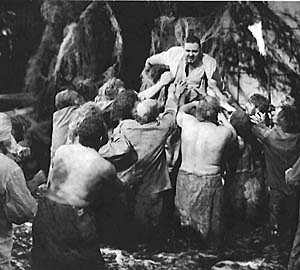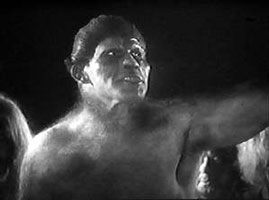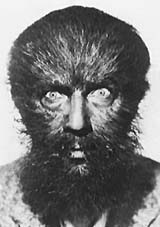 Island of Lost Souls (1933)
Island of Lost Souls (1933)
Director: Erle C. Kenton
The novels of H. G. Wells have proven irresistible to film makers with a taste for the fantastical. The Island of Dr. Moreau has been filmed three times, but the 1933 version was the first and, in my opinion, the best. It's amazing how much suspense can be achieved with so little pyrotechnics. Stripped to its bare essentials and focusing on human cruelty, this masterful horror film shares much in common with the fine films of the eerie produced by Val Lewton. Island of Lost Souls sent a shiver down my spine more than once.
The story is laid out simply and economically. Edward Parker (Richard Arlen) is sailing from Africa to Samoa aboard a freighter laden with cages of wild animals to meet his fiancee Ruth (Leila Hyams). He befriends the wireless operator, who warns him to stay clear of the frequently drunk and disorderly Captain Davies (Stanley Fields). Nonetheless, Parker sees Davies mistreat M'ling (Tetsu Komai), the odd-looking servant of Dr. Montgomery (Arthur Hohl), and punches Davies' lights out. Parker has wired Ruth when he will be arriving, but before the ship makes port, it stops to drop its animal cargo, Dr. Montgomery, and M'ling at a small island inhabited by Dr. Moreau (Charles Laughton). Davies, still smarting from Parker's attack, informs Parker that he will be disembarking there, too. When Parker resists, Davies punches him and throws him overboard onto the deck of Moreau's ship. Moreau protests, but to no avail. He is forced to bring Parker to the island, about which macabre rumors have been floated all across the South Seas.
Moreau threads the small party through a wooded area using a whip to scare off strange creatures who look human. Once they reach the big house on the hill where Moreau lives, we finally get a good look at him. Laughton's round face and obsequious smile are framed by a pencil-stubble moustache and pencil goatee--a most ridiculous face! He cautions Parker to stay in the house.
A young woman with a decidedly feline look is called by Moreau. He has decided to see if she is a real woman, with real human attractions and instincts. This is the first explicit indication that something very fishy is going on, and Moreau is responsible for it. The woman, Lota (Kathleen Burke), is brought to Parker, and he tries to make small talk with her. She can speak, but is awkward around him. Moreau retires from the room and watches them from a distance. It appears that Lota is indeed drawn to Parker, and Moreau feels triumphant.
He turns his attention to a compound a short distance from the house where several grass huts stand and a fire burns. He, along with one of the inhabitants of the compound known as the Sayer of the Law (Bela Lugosi), leads the odd-looking men below him in a recitation of the Law, punctuating each law (no walking on four limbs, no tasting of flesh, no taking of life) with the admonishment, "Are we not men?" Following a satisfactory "prayer" session, Moreau enters the House of Pain to work with Montgomery on his research--specifically, on a hairy man strapped to a gurney who starts to scream as soon as the two men approach. It is now sickeningly obvious to us that Moreau has been turning beasts into humans.
When Parker discovers Moreau's secret, the film takes a much more sinister turn. Laughton, like the vast majority of British  actors, knows exactly how to appear utterly civilized and yet ruthless. Moreau is not inclined to kill Parker--his experiments are about creating human life, not destroying it. Yet, he will not let his godlike ambitions be thwarted. When Ruth appears, along with the skipper of the ship that has taken her to Parker's last known position, Moreau sets one of his creations, Ouran (Hans Steinke), after the captain to ensure that no one leaves the island. This act proves his undoing.
actors, knows exactly how to appear utterly civilized and yet ruthless. Moreau is not inclined to kill Parker--his experiments are about creating human life, not destroying it. Yet, he will not let his godlike ambitions be thwarted. When Ruth appears, along with the skipper of the ship that has taken her to Parker's last known position, Moreau sets one of his creations, Ouran (Hans Steinke), after the captain to ensure that no one leaves the island. This act proves his undoing.
In the hands of director Kenton, Moreau's creations balance their animal origins with their humanlike forms and indoctrination. It would be easy to dismiss their revolt against Moreau as just another horror film convention, but there is really something righteous and pitiable about their actions. While we know they must be destroyed as aberrations of nature, there is sadness in watching it happen. They provide a persuasive case against the meddling of humanity in the natural order of things.
Other aspects of the film are authentically felt and add to the accumulation of horror. From Davies' utter callousness and imperiousness about his ship--a parallel with Moreau's--to Montgomery, a disgraced former medical student who has made his bargain with the devil to save his own skin, we are faced with the depravity of humanity. This depravity contrasts sharply with the poor animals that are stripped of their essence and made to conform to a mad scientist's conception of perfection. The lost souls referred to in the title of this film, changed as it is from H. G. Wells' title, could very well refer to Dr. Moreau and Montgomery. If we suppose that it refers to the animals, the break with scripture that states that only humans have souls is an ironic one indeed.
 Laughton is an extremely effective villian in this film. Lugosi, with a smaller part and hampered by a hairy visage, still uses his voice to command moral authority over Laughton. He is an effective leader of his kind, and Laughton's Moreau maintains his hubristic position against them even as they move to destroy him. The other actors are B-movie material, with the exception of Kathleen Burke. Her Lota is a superb prototype for other catwomen to come, from Simone Simon in the 1942 Cat People to Nastassja Kinski in the 1982 remake of that film, and even to Jennifer Blaire in the horror satire The Lost Skeleton of Cadavra (2001).
Laughton is an extremely effective villian in this film. Lugosi, with a smaller part and hampered by a hairy visage, still uses his voice to command moral authority over Laughton. He is an effective leader of his kind, and Laughton's Moreau maintains his hubristic position against them even as they move to destroy him. The other actors are B-movie material, with the exception of Kathleen Burke. Her Lota is a superb prototype for other catwomen to come, from Simone Simon in the 1942 Cat People to Nastassja Kinski in the 1982 remake of that film, and even to Jennifer Blaire in the horror satire The Lost Skeleton of Cadavra (2001).
Island of Lost Souls is both a genuinely scary horror movie and a morality tale. In an age in which cosmetic surgery and genetic engineering are well-accepted practices, it would behoove us to consider the message H. G. Wells had for humanity. Island of Lost Souls is an eerie and sensitive messenger. l


0 Comments:
Post a Comment
<< Home